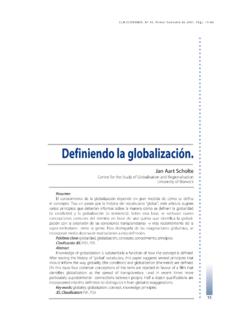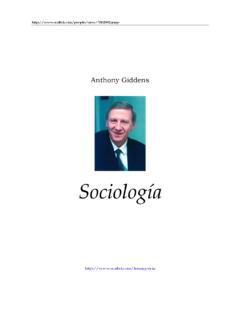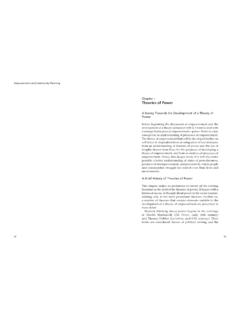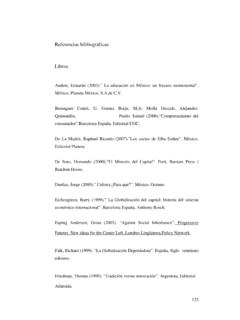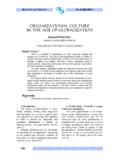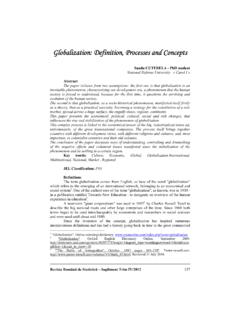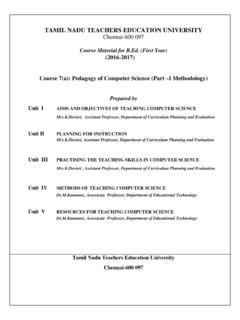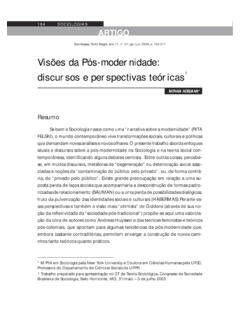Transcription of Risk - Concept Text
1 NUFFIELD TRUST GLOBAL PROGRAMME ON HEALTH, FOREIGN POLICY AND SECURITYRISK CASE STUDIESThe Concept of RiskBill Durodi Senior Lecturer in Risk and SecurityDefence College of Management and TechnologyCranfield University, Shrivenham, Swindon, SN6 8LA, UKThe Nuffield TrustThe Nuffield Health & Social Services FundUK Global Health ProgrammeThe Rise of RiskRisk is an abstraction that represents the likelihood of specific outcomes. As such, risksappear largely external to us - particular events occur whether we want them to or not. Ineffect, risks have always been around, however, that we conceive of something as being a risk,is a product of social progress and the evolution of human ability to discern patterns, and their limitations, in nature, in order to subject these toour actions, has enabled development. In turn, the meaning and history of risk have changedtoo.
2 Our understanding of risk reflects our own confidence or lack of it in human will andagency. Hence, it has gone through several qualitativetransformations from randomness tochance and probability and, a more recent focus on uncertainty (1).In recent years, there has also been a phenomenal quantitativegrowth in references to word exploded into the academic literature in the 1990s, coinciding roughly with thetranslation into English of Ulrich Beck s sociological best-seller, Risk Society, in 1992 (2).Since that time, the number of conferences, courses, centres and journals, focusing on, ormaking use of, the word risk, have expanded rapidly development begs our understanding. Do we face more risks today? Have we becomemore consciousof the various risks that we face? Or, are these risks now of a qualitativelydifferentorder?
3 Beck, and the British sociologist, Anthony Giddens, err toward the latter ofthese possible conclusions. They suggest that society now faces new risks those generatedby ourselves. Accordingly, Beck and Giddens distinguish between what they consider to benatural risksand what they have come to define as manufactured risk(3). There are numerous problems with these distinctions, not least of which is trying tounderstand where one category ends and the other begins. For instance, it could be arguedthat humanity itself, has only come to exist in a self-conscious state through its separationfrom nature, and hence most of the risks that impact upon us are necessarily mediated inunnatural ways. What s more, the widely-held assumption that natural products or processesare necessarily better for us than manufactured ones is simply of these writers, and many others besides, note a heightened consciousness of riskwithincontemporary society.
4 This is often attributed to a loss of control over who determines whatrisks are acceptable for society, as well as the social distribution of costs and benefits. Fewhowever, critically examine such perceptions. They tend to be accepted as a , the solutions proffered revolve around the need to regulate risk, rather than theneed to understand it may be that, rather than living in a Risk Society, we now live in a Risk Perception if so, rather than taking risks at face value, it is their perception that ought to be thesubject of sociological analysis and investigation. Unfortunately today, many seem to fetishisepublic perceptions, considering it almost rude to interrogate them. But, whilst dismissingpeople s views may well be patronising, so too is adapting or pandering to these academic and social commentator, Frank Furedi, has noted that over recent years our useof the word riskhas altered.
5 Risk used to be considered, at least in part, as a consciousrelationship. People could choose to take a risk, implying an active engagement between thehuman subject and objective reality. Nowadays, many references to risk are prefixed by theword at. We are now increasingly perceived of as being at riskin numerous situations (4).This reveals and reflects a growing sense of human passivity, disconnection or impotence inthe face of what are assumed to be implacable or inevitable external further shift has been the growing tendency to focus more on hazard and uncertainty thanon risk and probability. Hazard is understood to be the potentialeffect of a situation, processor product, such as its being unstable, corrosive or carcinogenic. Risk refers to the actualchance of something happening, taking account of real behaviour or exposure. This is oftenexpressed as a probability.
6 Everything that we do exposes us to hazards. It is howwe dothings, and howoften, that determines the for instance, stairs are a hazard, but it is the likelihood of injury that is known as the latter will be a function of variables such as step height, lighting conditions, age andspeed. The call, emanating from certain quarters, to regulate specific situations on the basisof their innatehazardous properties is therefore, whether consciously or not, a call to removehuman agencyfrom the equation. In a similar vein, uncertainty refers to the difficulty of knowing what mayoccur in advanceof experience. It seeks to distinguish situations where we can base decisions upon data, fromthose where we can not. But that there remain unknowns to be determined in all instances ishardly new. In fact, we can only move towards an appreciation of what we do not know bystarting from what we doknow.
7 Unlike risk and probability, prioritising hazard anduncertainty, downplays our understanding, competence and respective shifts; the quantitativeexplosion in reference to risk in all possible walks oflife, the focus on people s perceptionsof risk over the actuality of the dangers they face, theshift in how we use the word riskfrom being a verb reflecting an activerelationship tobecoming a noun, used in a passivesense, and the desire to prioritise invariant hazardsandunknown uncertaintiesover the conscious choiceor ability to engage with riskand to determineprobabilities, appear to share similar roots. It is to this that I now turn my RISE OF RISKThe Demise of SocietyWhen Margaret Thatcher famously suggested in an interview that there is no such thing associety (5), she was, understandably, derided by many. But today, it would appear that herstatement was almost prescient.
8 In form at least, if not in content, there is now very littleawareness of the extent to which many phenomena are shaped and determined by socialforces. Instead, there has emerged a growing emphasis on nature and individuals as thepresumed roots of most , science and psychology now occupy peculiar and privileged positions incontemporary life (6). Despite the fact that many perceived problems in the world today areshaped more by their social contextand origins than by their scientific or psychologicalcontent, it is the latter that are increasingly scrutinised and held to analyses of the impact of genetically modified organisms on the environment to studiesof psychological orientations and preferences, from concerns about the consequences ofexposure to endocrine disrupting chemicals on early-years development to attempts topredict behaviour in a terrorist incident, such an outlook presents our world and ourresponses to it as being increasingly determined by impulses either entirely external to us, orso innately internal that there is little we can do about , at the same time as natural forces and individual behaviour are singled-out andassessed.
9 They are also feared and monitored as potentially disruptive sources of risk to ourlives. Why is this? How did the demise of a broader understanding of ourselves, as well asmany of the phenomena we observe as being broadly social in content, come about? Theseare important issues to address, as they impact upon our sense of the possibility oftransforming the world. If things are largely scientifically or psychologically given, then theremay be little point in trying to change is the gradual erosion of any sense of the need for, and the possibility to achieve, socialchange that drives this outlook. In the past, radicals sought to transcend the limitationsimposed upon society by advocating widespread social reform. Science fed into, and fed off,this broader aspiration and dynamic. Science can transform society, but it is also a product ofsociety and a society that does not desire transformation, or fears the consequences ofchange, is unlikely to develop as rapidly as it could otherwise (7).
10 The emphasis often given as to the ability of science to effect social change is one-sided. Itwas the aspiration for social progress that gave humanity confidence in the power of its ownreason in the first place a factor that then proved of significant importance to thedevelopment of science. The Scientific Revolution represented the triumph of rationality andexperimentation over the superstition, speculation, diktat and domination that had gonebefore. It was a practical battering-ram with which to challenge perception, prejudice andpower. But science was also the product of a broader social dynamism as well as becomingan essential contributor to , just as the initial dynamic behind science was social change, so social change or moreparticularly the lack of it could circumscribe it too. Initially this came from the vociferousrejection of the old religious and monarchical orders that had been supplanted.
